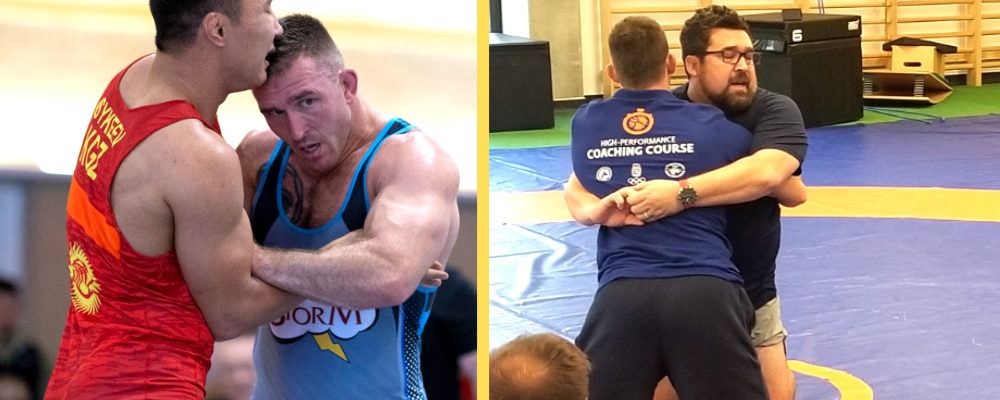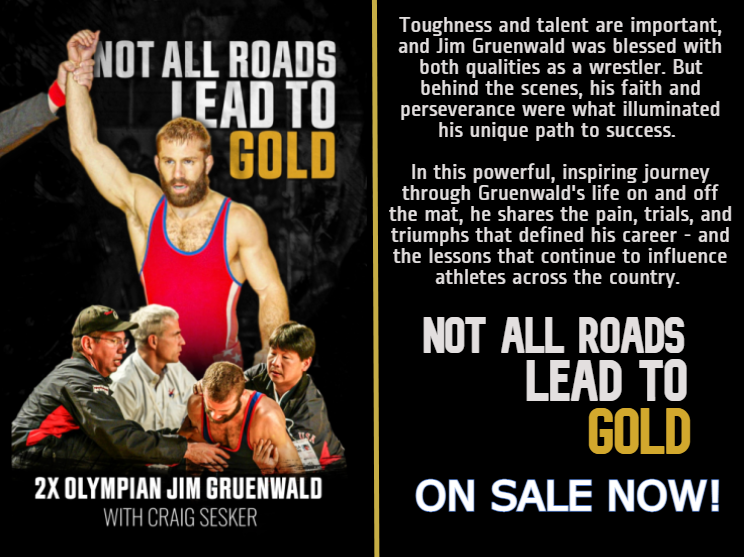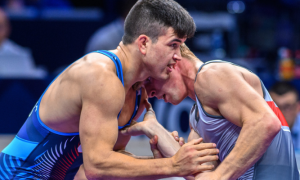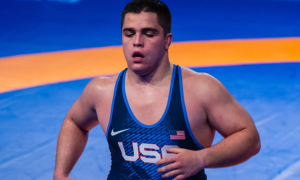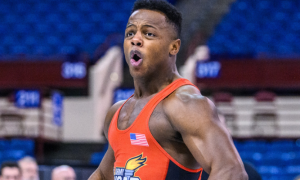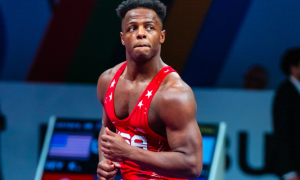This past Friday saw the second Bill Farrell Memorial of 2022, with the first edition having taken place seven months ago in Cedar Falls, Iowa instead of its actual homebase in New York. The event’s return to Central Park South was considered, at least by those inside of the American Greco-Roman community, a milestone of sorts. Not only had the tournament been absent from NYC for three years, it was also the de-facto opener of the new season for the vast majority of Greco participants. In addition, a healthy number of international wrestlers delivered a needed touch of credibility, especially given that several of the bracket sizes were disappointingly light.
Five United States athletes placed first, with Dalton Roberts (60 kg, Army/WCAP) and Hayden Tuma (67 kg, Suples) leading the charge. Roberts, because he had prevailed in yet another hard-fought battle with former stablemate Randon Miranda (Unattached); and Tuma due to winning his second-career Farrell title, this time without surrendering an offensive point across four matches.
As was the expectation, it was a parade of American medalists. 18 USA wrestlers earned hardware. Key among them were three Seniors who were absent from last spring’s selection season: Dylan “Greco’s Son” Gregerson (63 kg, UVRTC), Rich Carlson (87 kg, Minnesota Storm), and Donny Longengyke (130 kg, Minnesota Storm). All three finished with silver, and all three had to navigate suitably competitive brackets.
Carlson in particular was an interesting case. In the final of the April Farrell, the Minnesota rep was down 7-0 in the second period to eventual World Teamer Alan Vera (NYAC) when he unleashed a throw-to-pin combination that also translated to a spot on the US Pan-Ams roster. Carlson did in fact go on to enter the Pan-American Championships the following month, but that was it. He bypassed the World Team Trials, where he would have been an obvious top contender, and he remained dormant until Friday’s proceedings.
In his first match at the Bill Farrell Memorial, Carlson staged another memorable comeback. Asykeev Kalidin (KGZ) enjoyed a 2-0 passive lead with time a factor, and Carlson once again responded in clutch fashion. He had been awarded the third par terre chance and — although he did not score from top — it helped lead to a correct-throw sequence that clinched him the victory via criteria. Carlson would then advance to the finals, where he was decisioned by Egyptian Ahmed Hassan Ahmed.
Carlson spoke to his silver-medal performance, how he felt throughout the tournament, and how he plans on building from it going forward entering the New Year.
5PM: This was your first tournament since the Pan-Ams, which was over six months ago. What did you do as far as working up to become competitively ready for this tournament, and this season overall?
Rich Carlson: I feel like between the Pan-Ams and this past weekend that I haven’t missed a beat training-wise. Obviously, it would have been nice to have competed last summer and to have had an opportunity to make the World Team, but I forewent that because I had military duty. It was optional, but I had the opportunity to represent the United States in a military competition and that’s a whole different story. My military duty occasionally takes me away. Sometimes I feel that it helps periodize my training a little bit. I train really, really hard; and I feel that if I didn’t get pulled away by the National Guard — one week training here, one week training there — that I’d run myself into the ground. I’m not good at taking my foot off the pedal and will consistently over-train.
From the Pan-Ams up until now, I feel that my training has gone really well. There are slight breaks here and there that allow me to train really hard and then recover. Even though I didn’t have a full season last year, I feel that I’ve still embarked on an upwards trajectory as far as my skills and my competitiveness.
5PM: Were there any concerns for you regarding sharpness? Outside of winning the tournament, did you have any technical or tactical goals that were to accompany your wrestling?
Carlson: I felt like my sharpness was on. I felt like I wrestled really well. Anytime you have a long break before a competition, you might be a little hesitant or worried about how it will go. But as soon as you step on the mat, it all goes away, especially if you get off on the right foot and pick up a win. That gives you a confidence boost and then it’s like, Okay, I’m back to where I was at.
As far as goals go, because I would potentially be wrestling foreigners, I did not want to get scored on in par terre. That is something that I feel is essential for a US wrestler to medal internationally or on the World level. Being able to wrestle on the feet, get to ties and clear ties, is essential, too. But I also think that doesn’t even matter if your par terre is not adequate to hang with the best in the world. So, that was one of my goals, to develop my par terre and not get scored on. It is also because that the guys I wrestle from the US who I’ve lost to, like Alan Vera and Ben Provisor, they didn’t beat me on the feet. When they had beaten me, it was from par terre. You take par terre away and those matches are basically a tie. That has been my focus lately. And — not only training defense from par terre, but scoring from par terre.
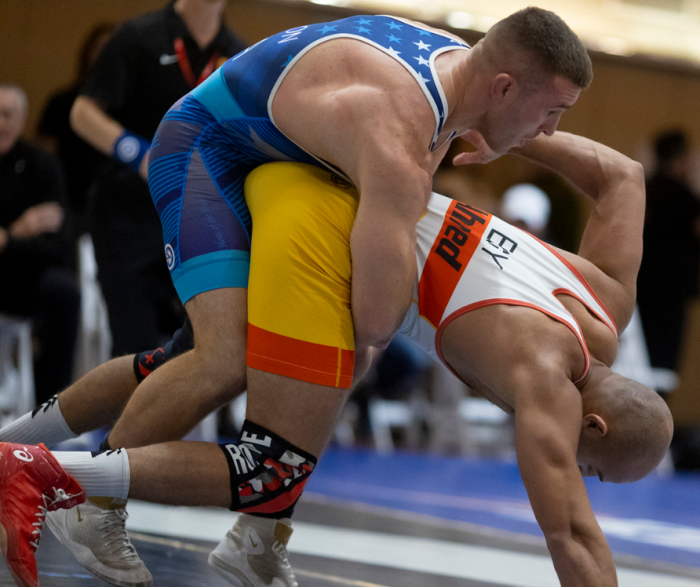
Carlson went 2-1 in the 2022 Bill Farrell Memorial, finishing second to Egypt’s Ahmed Hassan Ahmed. In April, Carlson prevailed at the Iowa edition of the Farrell, where he had earned gold by coming back with a throw-pin against Alan Vera. (Photo: Larry Slater)
5PM: You just alluded to something, getting that first match out of the way. Your first match on Friday was a tough one and you had to come back late to win it. That right there must have brought some confidence, pulling out a win in that type of match against a quality opponent.
Carlson: Well, that first passivity, it’s whatever. It didn’t really matter. They could call him, they could call me. They were going to call someone. It was just kind of how the match was going. But then in the second period, they just decided to call me again, which I thought was nonsense, but whatever. They did call three passivities, so I got a chance on top. You don’t get a point for the third passivity. I was down 2-0, got my chance on top, and then I got into a side-lift position. He wiggled out and got to his feet. I think I ended up attempting a duck-under and it didn’t work — but I came up into a bodylock, stepped to the edge, and correct-threw for two.
It felt amazing. At the time, I thought he was an Olympian because I had seen something about there being an Olympian at my weight. I was hyped, to have an Olympic representative from Kyrgyzstan. Then I found out later that it wasn’t the same guy, he was in the weight class above me. It was kind of a bummer to find that out later (laughs). But I was hyped before the match to have what I thought was an Olympian. I fought my butt off. Maybe that was a good thing. It was more motivation to go win.
You know, I feel like I’ve always been good at taking breaks from wrestling and then coming back where I left off. You know this, too, you have followed my wrestling career. How many times have I stepped away for even longer? In the grand scheme of things, this wasn’t even my longest break by any means. The difference is that before this tournament, I had been wrestling and training the whole time.
5PM: Leading up to the ’23 selection season that begins in the spring, how active do you want to be? And is there any chance you might make it overseas, say, sometime before the Open?
Rich Carlson: Yeah, absolutely. This is going to be the most active over the next few years that you will have ever seen me as far as a Greco wrestling season goes. Coming up in December, in just two weeks from now, I am going to go to camp at the Olympic Training Center. Then next year, I am definitely going to go to Europe and compete in a tournament at some point. Hopefully I am going to spend more time at the Olympic Training Center, as well. There are plans to be as active as I can competition-wise and training-wise.
I’m pretty fortunate in that my employer, Cardinal Glass Industries, offered me a new position at work. I told them, “I’ll be honest with you guys, I was actually thinking of quitting because I want to focus on wrestling.” Then I asked them, “Is there any way that we can make this new role work to where I can devote more time towards wrestling?” And they have been super-supportive of both my wrestling and military careers, and are going to give me way, way more time-off than I would otherwise have to go wrestle. The company is very supportive of the military, very supportive of Olympic aspirations, and very supportive of wrestling. They have been nothing but supportive of me since I’ve been working there, which is three years. They understand that this is the dream of a lifetime and don’t want to take that away from me. I think they also value having me as one of their employees and want to make my job easier insofar as I can still go to work while pursuing my dream.
Dominguez Featured as UWW High Performance Coach
Earlier this month, MWC founder and multi-time US World Team coach Zac Dominguez was deployed to Hungary on behalf of United World Wrestling for the inaugural High Performance Regional Coaching Course. Held in Budapest at KIMBA (Kozma István Wrestling Academy; i.e., HUN’s version of the OTC), the days-long clinic also included other presenters of high-repute such as World champ/multi-time medalist Arsen Julfalakyan (ARM), World champ/Olympic silver Tamas Lorincz and his medal-winning brother Viktor, Dr. Bahman Mirzaei of Iran, and Dr. Mario Baic of Croatia.
“Busy” doesn’t begin to describe Dominguez, either in totality or when isolating his endeavors to just this calendar year. Between operating MWC (which boasts several emerging Seniors), serving on various Team USA coaching staffs, and tirelessly volunteering for a national governing body that somehow fails to truly appreciate his knowledge and efforts, he rarely enjoys downtime. Such was the case when he was asked to present in Hungary. Dominguez had only recently returned from coaching at the U23 World Championships in Pontevedra, Spain and, on short notice, prepared himself accordingly and hopped on his third cross-Atlantic flight in the span of three months. But the experience, to hear him tell it, was well worth the added miles logged and could potentially yield fruitful insights for American wrestlers and coaches within the Greco-Roman program, should there indeed be individuals involved with the open-mindedness to absorb what he has to say.
5PM: First of all, how were you contacted to take part in the High Performance course?
Zac Dominguez: Zach Errett had reached out to me. Usually, referees don’t text me unless they want to yell at me, or want me to yell at someone else (laughs). But he wrote in there something like, Would you give me a call in the next 30 minutes? So I called him and he told me that they were organizing this course, that it was the first one they were ever doing, and asked if I’d be interested in participating. The first words out of my mouth were “yes”. There was no hesitation, and the reason why is that if I don’t say “yes”, they might not ever ask me again. Or, I just might not get this opportunity again. I knew that it was going to be tight. I had arrived home from Spain, then went to pre-season nationals, and was basically home for 18 hours. It was really tight.
But the first step was a Zoom call that included everyone they were inviting to teach. Dr. Mirzaei spoke and he discussed how Iran trained. Everything about they train. Meso, macro, micro… Everything about how they train. And in this meeting, they explained how they wanted three items from those of us who would be teaching, items that we would be interested in going over. I was slightly dumbfounded, because I did not know that it was on this large of a scale. I thought it was going to be U15 or U17 coaching. I figured that would be my designation, working with those types of coaches. Ultimately, I wound up taking pictures with the Lorincz brothers and Peter Basci, and those were the people I was having conversations with.
5PM: What were the principle concepts that they were assigning? To you and everyone else?
Dominguez: Part of it was simply to illustrate scenarios that could help all of us become better coaches. To learn different methods and ideas which could assist in teaching our athletes. Luckily, luckily, I didn’t go until Friday. The first day was “Edge Theory”, as in how you wrestle on the edge. I had some very good conversations with the Lorincz brothers and Basci. There were a couple of guys who could speak English. My one thing was that I had a question. Because, they are all coaching now. And Basci, he is now sort of the overseer of everything for Hungary, so I asked him, “What would you rather coach: a 1-1 match or a 6-0 match?” And he looked at me, and said, “Of course I’d rather coach a 6-0 match!” To which I replied, “Then why do we insist on just the step-out, or just barely something else?” My thing was, We’re all saying that we would want 6-0, but then why aren’t we scoring more points and taking advantage of situations that we know are going to happen? Just discussing topics like that was really fun.
The monster to me in the room was Arsen (Julfalakyan). First off, I can’t believe that he was a 74, 75 kilogram wrestler because he is so much smaller than Andy (Bisek). On video, you look at him and think, He’s so big. In person, it was, Hey Arsen, you’re a little fella (laughs). But of course, we’re talking about a World Champion, multiple-time Olympian, medalist, and all of that. He just has a presence, whereas in that environment someone like myself had to earn a little more trust. I had to walk people down a path which said, ‘I might not have what you have as far as credentials, but I’ve been around wrestling matches for at least as long as you have, and have been coaching for even longer. At this stage, I’ve been coaching as long as I was a competitor. I wanted them to know that I understood all that they were saying, and we would deconstruct technique.
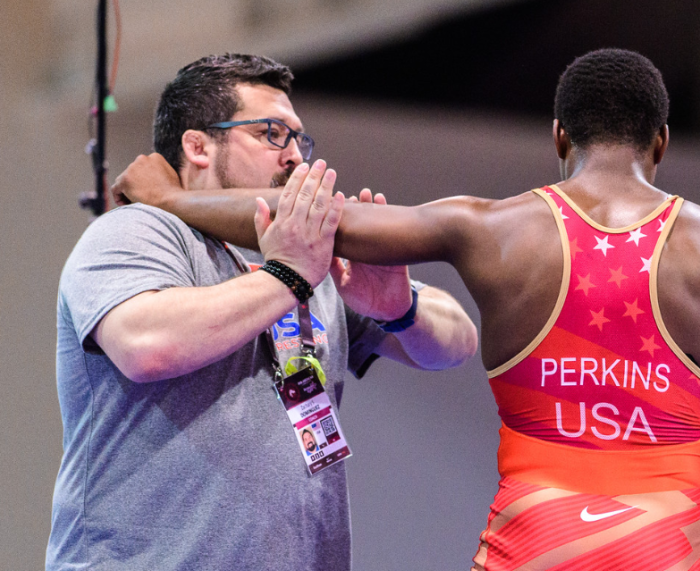
Dominguez, shown here with fellow Nebraskan and current US star RaVaughn Perkins at the ’22 Pan-Am Championships, has been on numerous American World Team coaching staffs through the years and was recently invited to present at the first-ever United World Wrestling High Performance Regional Coaching Course in Budapest, HUN. (Photo: Tony Rotundo)
5PM: How were the days broken down regarding topics or lessons?
Dominguez: The first day was “Edge Theory”, the second was “Par Terre Basics”. Those were the wrestling room scenarios that I had went over. Arsen went over ways to transition with your lock… We all went over something and then we would rotate in groups. It was three hours in the wrestling room and three hours upstairs in the classroom.
The doctor from Iran explained a lot pertaining to how they test, which was extremely insightful. We do not do enough testing in the United States. I raised my hand and asked him how did Iran know that Yazdani would be a freestyle wrestler. And he flat-out told me that based on Yazdani’s measurables, they knew that he would be good for five medals or some ridiculous amount. He, in so many words, intimated that based on the numbers they use that they already know what is going to happen. They can project based on their testing metrics, which as we can all see are obviously incredibly accurate. It is out-of-control awesome.
5PM: How did this format align with what you were to discuss?
Dominguez: I saw it as, We need to know what to teach these guys because they were such impressive athletes. My focus was presenting how to communicate, and how to apply technology in the wrestling room. I love technology in the wrestling room, and it made me feel good because everyone perked up when I began explaining how I utilize certain tools.
As a coach, I’ll set traps. I will position a topic in a specific way so as to receive the answers I want. Here, I told each table to come up with an area with which they might struggle regarding communication. I already knew what those would be, because I had heard everyone talking two days prior. So when I went to the next frame in my slideshow, I already had the answers they needed. They were like, Ah, you’re so smart! (Laughs) But I had paid attention. I already knew what to address going by what they had been discussing earlier. So, I set my trap (laughs).
It came down to understanding from which standpoint I could be of service. Most of this audience, obviously, were phenomenal, phenomenal athletes at the highest competitive level. But what they also were, was very young in the coaching world. The more we opened up with each other during the first two days really helped me not be so nervous going into my classroom presentations. I had to recognize that I had a much more pronounced amount of coaching experience and that they were just starting out as coaches. I had something to offer; and, as you might suspect, these gentlemen from overseas are responsive, appreciative, and respectful. To them, I had the coaching knowledge and they were very receptive to what I had to offer when it came to the topics I was presenting. It was very encouraging. I am really thankful to Zach Errett, the UWW Education Manager, for inviting me.
5PM: How do you see this course affecting Greco-Roman coaching internationally, assuming there are more of them? Also, how would you like to see some of what was gleaned on your end adopted in the US?
Zac Dominguez: Overseas, coaches from other countries and regions do talk to each other, but they do not have a consistent line of communication. It’s not that they can’t get it. They just don’t have that line. The word I think of is “collaboration”, which means more than just talking. Communication is just calling someone and asking how they’re doing. Collaboration means that we are going to work together in order to achieve a common goal. That is what we need to increasingly work towards if we want to build the sport, and also improve in our own country.
I think of someone like Momir (Petkovic), because he is an example of someone in our country who, although we had him as a major coach in the US, we didn’t even lean on enough. When Momir is at a tournament overseas, he is one of the most popular human beings in the world. I would stand behind him so that maybe, maybe, when someone would say something nice to him it might deflect onto me (laughs). That’s the collaboration we need in Greco, here in the US with our own amazing coaches. Freestyle? They have folkstyle. They are the same coaches. They all talk to each other. In Greco, we have to find ways to collaborate. I’m not even saying that we need to work together, but to improve our understanding of why other countries are so good at this. We need to understand how they are doing it.
I can tell you right now that the Iranians test. They look right at it. They look at their athletes, they measure them according to a variety of parameters, and determine whether they would be good enough to compete at the World level. Serbia uses a lot of old school training methods, like the “Cooper Test”. It was developed here by the US military, yet we don’t even use it here in our own program. I have never heard of it being used here. Iran has their own testing, Russia has their own, and we need our own. And it would not be to exclude athletes on our part. Instead, it would be used to identify their strengths and weaknesses while also setting a bar of expectations that dedicated athletes would have to meet. It’s simple.
Also — the amount of stuff they do with their young wrestlers overseas is different. Our U15 and U17 in the United States is highly-competitive. Over there, we are way more developed by comparison, just for this moment in time. And then it switches because the amount of competition opens up. I asked them what is the average number of tournaments their best U15 Greco athletes get a year. The answer was four. Four. Here, they have already logged like 200 matches by the time they get to a Trials. These coaches from Europe couldn’t believe it. Now, should our US age-groupers have only four tournaments in a year? No. But should they have 200 matches? No. That is something we can collaborate with them on, how to keep athletes before they instead choose folkstyle. I think that is something they can help us with.
Another thing is that we are consumed with recruiting athletes. For instance, we want wrestlers for Greco, and we need them. But we’re spending a lot of time on that when we should be worried about making sure that we have the necessary number of coaches to accommodate them. Freestyle here has thousands of coaches. Folkstyle, many thousands of coaches. Greco? We can count on our hands how many actual, legitimate Greco-Roman coaches there are in the US. We need to identify those coaches in our country who want to be a part of the program and would be a good fit.

Listen to “5PM52: Two-Time Olympian Jim Gruenwald” on Spreaker.
Listen to “5PM51: Lining up with Tanner Farmer” on Spreaker.
SUBSCRIBE TO THE FIVE POINT MOVE PODCAST
iTunes | Stitcher | Spreaker | Google Play Music

Notice: Trying to get property 'term_id' of non-object in /home/fivepointwp/webapps/fivepointwp/wp-content/themes/flex-mag/functions.php on line 999

